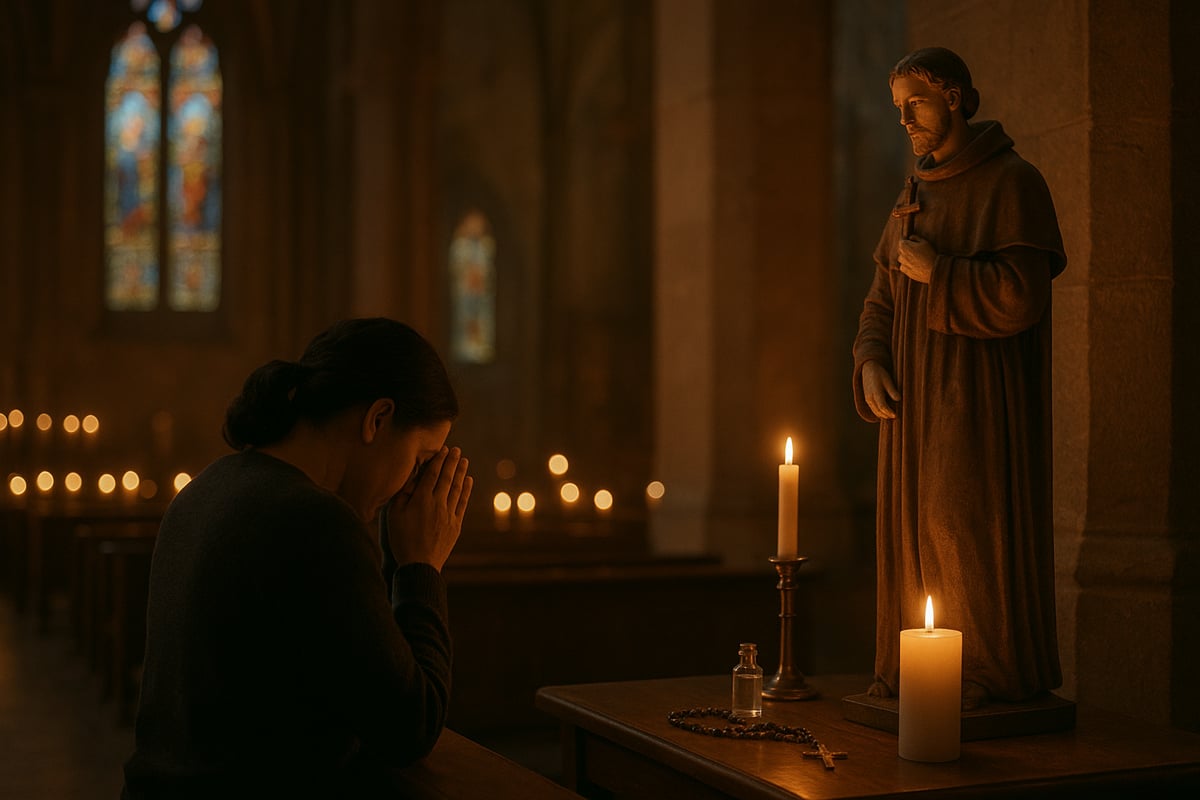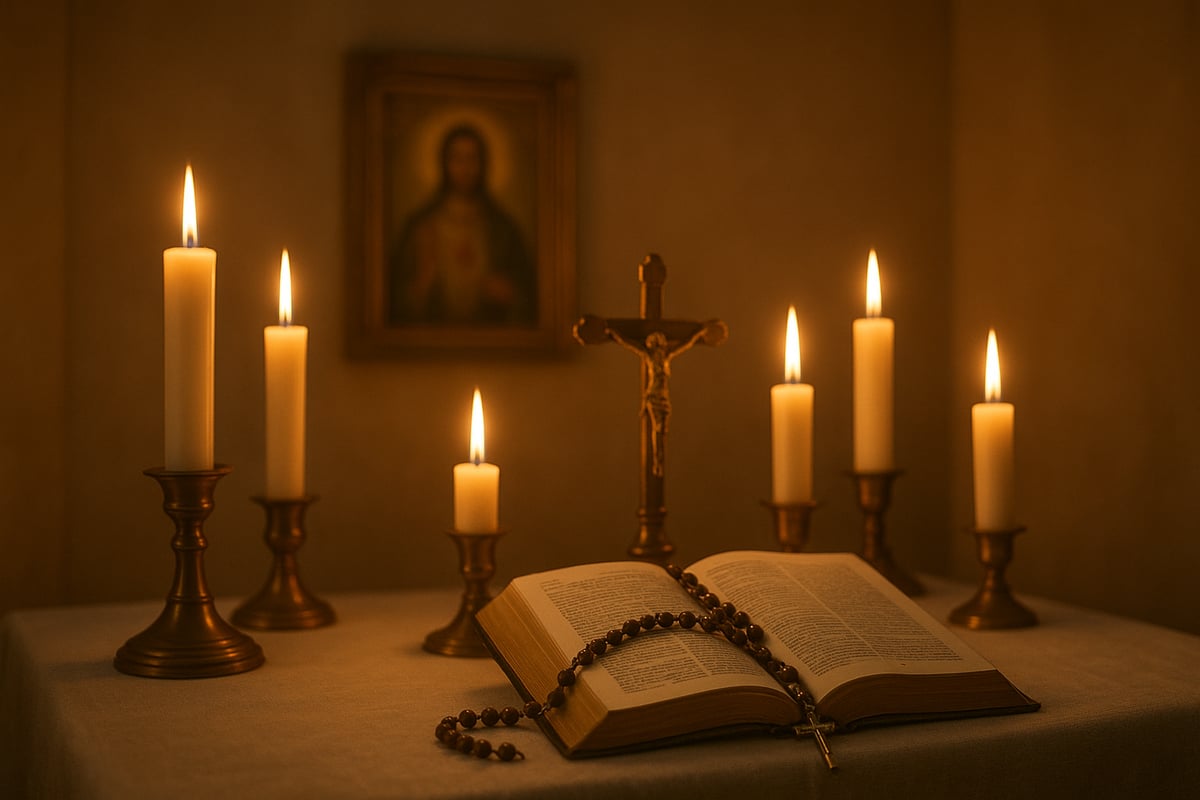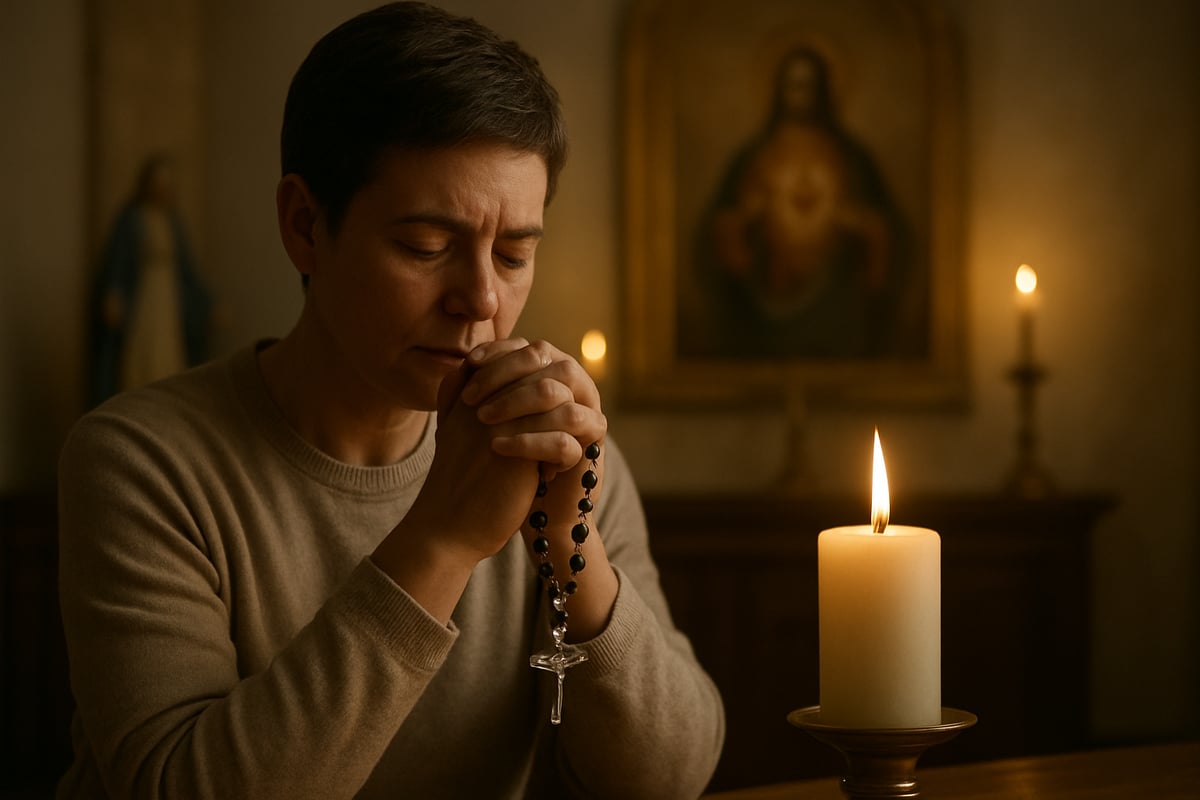A mother kneels in a quiet chapel, her heart heavy with worry for her sick child. Months later, she shares her story of unexpected healing, a testament to the power of catholic prayer for miracles. Stories like hers inspire hope and remind us that faith can move mountains.
This guide explores the catholic prayer for miracles, uniting centuries-old Catholic tradition with renewed hope for 2025. Here, you will find practical steps, prayers, and spiritual insights to deepen your faith and confidently seek God’s intervention.
We will cover Catholic teachings on miracles, the vital role of faith and hope, types of miracle prayers, a step-by-step prayer guide, inspiring examples, and answers to common questions. Let these real-life miracles and timeless truths spark your desire for a deeper prayer life, and encourage you to take action with practical guidance.
Understanding Catholic Teaching on Miracles
Miracles have always captured the Catholic imagination, offering hope and reassurance of God’s presence. To understand how to approach catholic prayer for miracles, it’s essential to explore what the Church teaches about these extraordinary events, the virtues that underpin miracle-seeking prayer, and the important roles of saints and community in this spiritual journey.

What Are Miracles in Catholicism?
In Catholic belief, miracles are extraordinary events attributed to God’s direct intervention, surpassing natural laws. These acts, like the healing at Lourdes or the sun dancing at Fatima, serve as tangible signs of divine love and mercy.
The Church distinguishes between public miracles, such as those in Scripture, and private miracles, which occur in the lives of individuals. Documented miracles are carefully investigated, especially during canonization processes. The Church uses medical and theological experts to confirm authenticity, ensuring discernment and avoiding superstition.
Miracles affirm faith, drawing people closer to God. For those interested in real-life accounts and Church-recognized miracles, the Catholic Miracles Collection provides inspiring stories and resources that deepen understanding of catholic prayer for miracles.
Theological Foundations: Faith, Hope, and God’s Will
Faith, hope, and a humble openness to God’s will form the core of catholic prayer for miracles. Faith is the trust that God is all-powerful and loving, while hope is the confident expectation that He fulfills His promises.
Catholic teaching emphasizes aligning prayer with God’s will, as outlined in the Catechism. Miracles are never guaranteed, but the sacraments provide channels for God’s grace. Human petitions and divine providence work together, and perseverance in prayer is encouraged.
Ultimately, acceptance of God’s answer—whether miraculous or not—reflects mature faith. This perspective helps believers approach catholic prayer for miracles with both confidence and humility.
Why Pray for Miracles?
Praying for miracles is deeply rooted in Catholic tradition. Turning to God in times of need is encouraged by the Church, especially when situations seem impossible. Many testify to personal transformation and renewed hope through catholic prayer for miracles.
There is a distinction between praying for genuine needs and mere wants. Miracles become a way to grow in relationship with God, not just receive favors. Praying for others, especially in community, strengthens bonds and builds hope.
Psychologically, hope-filled prayer can bring comfort and peace in difficult times. Embracing catholic prayer for miracles is as much about deepening faith as it is about seeking intervention.
The Role of Saints and Intercessors
The Communion of Saints is central to catholic prayer for miracles. Catholics believe that saints, as holy men and women close to God, can intercede on our behalf. Scriptural support comes from passages like James 5:16, which encourages intercessory prayer.
Popular saints invoked for miracles include St. Jude for hopeless cases, St. Rita for the impossible, and St. Anthony for lost items. Devotions such as novenas, litanies, and chaplets involve repeated, persistent prayer.
The Church guides the faithful to venerate, not worship, saints. This distinction ensures that all glory is given to God, while honoring the saints as models and intercessors. Through these devotions, catholic prayer for miracles is enriched by the faith of those who have gone before us.
Types of Catholic Prayers for Miracles
Catholic prayer for miracles is rich and varied, drawing from centuries of tradition and personal faith. Understanding the main types of prayer helps believers find the best approach for their needs and circumstances.

Traditional Prayers and Novenas
Traditional prayers and novenas form the backbone of catholic prayer for miracles. A novena is a structured devotion lasting nine consecutive days, each with specific intentions and prayers. This practice reflects perseverance and trust in God’s timing.
Many Catholics turn to novenas dedicated to saints known for miraculous intercession, such as St. Jude, St. Rita, and St. Anthony. These prayers often coincide with feast days or urgent needs, offering comfort and focus during difficult times.
Common novena intentions include healing, urgent requests, or spiritual conversions. For a comprehensive selection of novenas and litanies, explore the Catholic Litanies and Novenas page for inspiration and guidance.
Spontaneous and Personal Prayer
Not every catholic prayer for miracles follows a script. Spontaneous and personal prayer invites believers to speak from the heart, directly addressing God with their needs, fears, and hopes.
Biblical examples include Jesus’ prayers in Gethsemane and heartfelt cries found in the Psalms. These moments teach that honesty and vulnerability are welcome in the spiritual life.
Personal prayers can happen at any time—before an icon, during a walk, or in moments of distress. The key is sincerity and openness, trusting that God listens to every plea for a miracle.
Praying with Scripture: Lectio Divina and the Psalms
Scripture offers a powerful foundation for catholic prayer for miracles. Lectio Divina, a traditional method, guides believers to read, meditate, pray, and contemplate passages that reveal God’s healing power.
Choosing miracle-themed stories, such as Mark 5:21-43 or the Psalms of hope, brings biblical examples into personal petitions. Psalms like 91 and 23 are especially favored for their messages of protection and trust.
By integrating Scripture into daily prayer, Catholics deepen faith and hope, finding new strength to seek God’s intervention in miraculous ways.
Sacramental Prayers and the Eucharist
The sacraments are central to catholic prayer for miracles. Participating in the Eucharist, receiving the Anointing of the Sick, or making a good confession unlocks channels of grace that support healing and transformation.
Eucharistic adoration is a special time to bring miracle requests before Christ truly present. Many have reported physical and spiritual healings while in the presence of the Blessed Sacrament.
Mass intentions and prayers during sacramental moments hold great significance. The Church teaches that these are not magical rituals, but profound encounters with God’s love and mercy.
Step-by-Step Guide: How to Pray for a Miracle in the Catholic Tradition
Seeking a miracle is a profound act of faith, hope, and trust in God’s loving power. The Catholic tradition offers a rich, structured approach for those desiring to pray for miracles. By following these steps, you can open your heart to God’s grace and confidently present your intentions through catholic prayer for miracles.

Preparing Your Heart and Mind
Before beginning any catholic prayer for miracles, it is important to enter prayer with a spirit of humility and openness. Start by examining your conscience and, if possible, receiving the Sacrament of Reconciliation. This helps clear your heart and mind, making space for God’s grace.
Create a prayerful environment:
- Choose a quiet space.
- Light a candle.
- Use sacramentals like holy water or a favorite icon.
Set your intention clearly. Invite the Holy Spirit to guide your words and desires. Remember the words from Matthew 7:7, “Ask, and you shall receive.” This foundation prepares you for meaningful, faith-filled prayer.
Choosing the Right Prayer or Devotion
Discernment is essential when selecting a catholic prayer for miracles. Consider the nature of your request and prayer tradition. Are you seeking help with a lost cause, healing, or urgent need? Each intention may have a corresponding saint or devotion.
Explore different forms:
- Novenas for persistent needs.
- Litanies for repeated petitions.
- Chaplets for focused prayer.
For guidance, you may find 7 Miraculous Novenas Every Catholic Should Know helpful to discover powerful, time-tested prayers. Sincerity matters more than formality—choose what resonates with your heart.
Praying with Faith and Perseverance
Miracles often unfold in God’s timing, not ours. When engaging in catholic prayer for miracles, trust in God’s wisdom and persist in daily prayer. Consider the parable of the persistent widow in Luke 18:1-8, which reminds us not to lose heart.
Ways to persevere:
- Keep a prayer journal.
- Join a parish or online prayer group.
- Combine prayer with fasting or sacrifice.
If answers seem delayed, avoid discouragement. Many testimonies speak of miracles received after months or even years of faithful petition. Let your perseverance deepen your faith and connection to God.
Invoking the Intercession of Saints and Angels
Catholics often seek the intercession of saints and angels during catholic prayer for miracles. Address your chosen saint with respect, asking for their prayers rather than worshipping them. Popular saints for miracles include St. Jude, St. Rita, and St. Anthony.
You might:
- Pray a novena to a saint.
- Ask your guardian angel for assistance.
- Share your intentions with loved ones for communal prayer.
Combine these prayers with Eucharistic adoration for added spiritual depth. The Church encourages devotion to saints, provided it complements your relationship with God.
Embracing God’s Will—Trusting in the Outcome
A core element of catholic prayer for miracles is surrendering your intention to God’s perfect will. Not every request will be answered as expected, but every prayer draws you closer to God’s heart. Acceptance and trust bring peace, even when miracles take a different form.
Reflect on the spiritual fruits of trust:
- Deeper faith
- Renewed hope
- Greater love
Learn from saints like St. Thérèse, who practiced the “little way” of trust and surrender. Embrace whatever answer God gives, knowing He works all things for good.
Continuing in Thanksgiving and Witness
Gratitude is vital in every catholic prayer for miracles. Even before a miracle occurs, thank God for His presence and care. Express your thanks through prayer, attending Mass, or acts of charity.
Ways to give thanks:
- Keep a gratitude journal.
- Publicly share your testimony to inspire others.
- Honor saints who have interceded for you.
The Catechism teaches that thanksgiving is central to prayer. By cultivating gratitude, you strengthen your hope and encourage others to pursue their own journey of faith and miracles.
Examples of Catholic Prayers for Miracles and Their Stories
Exploring catholic prayer for miracles reveals a tapestry of faith, hope, and divine intervention. Across centuries, Catholics have turned to specific prayers, saints, and sacraments, experiencing remarkable answers in their lives. The stories below highlight how these prayers continue to inspire and transform believers seeking God's help.

Prayers to St. Jude, St. Rita, and St. Anthony
When facing desperate situations, many Catholics turn to catholic prayer for miracles through the intercession of St. Jude, St. Rita, and St. Anthony. St. Jude is often called the patron of hopeless cases, St. Rita is invoked for impossible situations, and St. Anthony is renowned for finding lost things and granting unexpected favors.
A typical prayer to St. Jude begins, "O most holy Apostle, St. Jude, faithful servant and friend of Jesus, the Church honors and invokes you universally as the patron of hope." Testimonies abound of people receiving jobs, healings, or reconciled relationships after praying novenas to these saints.
Their feast days and novenas are celebrated worldwide, and countless miracles have been attributed to their intercession. For more about these saints and their powerful stories, visit Lives of the Saints Resources.
The Novena to St. Jude: A Step-by-Step Example
One of the most popular forms of catholic prayer for miracles is the novena to St. Jude. This nine-day devotion is structured to foster perseverance and hope. Each day, a specific prayer is recited, often alongside reading a relevant Scripture passage such as John 14:13, "Whatever you ask in my name, I will do it."
To keep focused, many create a peaceful space, light a candle, and write down their intentions. Testimonials describe how, after completing the novena, individuals have received clear answers, from healing to new opportunities.
Joining a community novena group or sharing intentions online can deepen the experience. Many Catholics return to this novena year after year, trusting in St. Jude’s intercession for their most urgent needs.
Healing and Urgent Need Prayers: St. Expedite and St. Peregrine
In moments of crisis, catholic prayer for miracles often includes turning to St. Expedite for urgent cases and St. Peregrine for healing, especially from cancer. A prayer to St. Expedite asks for swift help, "St. Expedite, you lay in rest, I come to you and ask this wish. Expedite now what I ask of you."
St. Peregrine, known as the "Cancer Saint," is invoked by those suffering from serious illness. Prayers to him include requests for strength, healing, and peace. Many share stories of unexpected recoveries and comfort after seeking his intercession.
These prayers are often incorporated into daily routines or used in emergencies, offering hope and assurance that no situation is beyond God's reach when approached with faith.
Miracles Through the Eucharist and Sacraments
Catholic prayer for miracles is deeply connected to the sacraments, especially the Eucharist. Eucharistic adoration has been the source of countless miracles, such as the transformation of bread and wine at Lanciano. Pilgrims visiting sites like Lourdes often recount physical and spiritual healings after receiving the sacraments.
The Anointing of the Sick brings comfort and, at times, astonishing recoveries. Confession is also cited as a channel for spiritual renewal and, occasionally, physical healing. For a closer look at documented Eucharistic miracles, explore Miracles of the Eucharist.
These stories remind us that grace flows through the Church’s sacramental life, offering hope to all who seek God’s intervention.
Modern Testimonies: Faith and Hope in 2025
Today, catholic prayer for miracles continues to shape lives worldwide. Recent testimonies include families reunited after years of separation, unexpected medical recoveries, and new beginnings following financial hardship. Online prayer communities allow people to share intentions and celebrate answered prayers together.
Social media has amplified these stories, making it easier to find encouragement and witness the power of faith. Parishes often invite members to share their experiences, building hope and unity.
Documenting and sharing personal miracles not only strengthens individual faith but also inspires others to trust in God’s providence through catholic prayer for miracles.
Common Questions and Misconceptions About Praying for Miracles
When it comes to catholic prayer for miracles, many Catholics have honest questions and face common misconceptions. Understanding the Church’s teachings can strengthen faith and help you approach miracle prayer with confidence and peace.
Does God Always Grant Miraculous Requests?
Not every catholic prayer for miracles is answered in the way we expect. The Church teaches that God, in His wisdom, knows what is best for each person. Sometimes He says “yes,” other times “no,” and often “wait.”
God’s response is always rooted in love and a deeper understanding of our needs. The saints often prayed for miracles and, when their requests were not granted, accepted God’s will with humility. Spiritual growth often comes from trusting God’s plan, even when it differs from our own.
Whether or not a miracle occurs, the act of praying opens us to God’s grace and draws us closer to Him.
Is It Superstitious to Pray for Miracles?
A common misconception is that catholic prayer for miracles is superstitious. The Church clearly distinguishes between authentic faith and superstition. True prayer is founded on trust in God, not on rituals or formulas that attempt to force His hand.
Superstition treats prayer as magic, while the Church calls us to a relationship with God. Praying novenas or using sacramentals is encouraged, but always with the right intention. For more on authentic Catholic practices, see the Most Powerful Novena For a Miracle, which explains the difference between faith and superstition.
The Church invites Catholics to discern and educate themselves, seeking guidance from spiritual directors and trusted resources.
Can Anyone Pray for Miracles, or Only Saints?
Absolutely, anyone can make a catholic prayer for miracles. All baptized Catholics are called to pray, intercede, and ask God for help in times of need. The saints serve as models and intercessors, not as the exclusive channel for miracles.
Scripture affirms, “The prayer of a righteous person avails much” (James 5:16). Ordinary people, not just saints, have experienced miracles through sincere prayer. The Church encourages everyone to approach God with confidence, regardless of spiritual status.
You do not need special qualifications—just faith, hope, and a heart open to God’s will.
How Can I Strengthen My Faith and Hope While Waiting?
Waiting for the outcome of a catholic prayer for miracles can be challenging. To sustain faith and hope, engage in daily prayer, reflect on Scripture, and join a supportive community. Regular Confession, acts of charity, and spiritual direction nurture perseverance.
Keep a journal to record prayers and moments of gratitude. Learning from the patience of the saints can also inspire you. Remember, God’s timing is perfect, and hope is never wasted.
Trust that your journey, even in waiting, draws you deeper into relationship with God.
As you reflect on the powerful examples of faith-filled prayer and miraculous stories shared in this guide, remember that the Communion of Saints offers a deep well of inspiration and intercession on your journey. If you feel called to strengthen your connection with these holy men and women, or wish to learn more about their lives and the miracles attributed to them, I invite you to continue exploring. Discover resources, devotionals, and meaningful items that can support your prayer life by visiting Explore Catholic Saints. Here, you can find the tools and inspiration to deepen your faith and hope in 2025.

